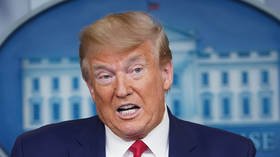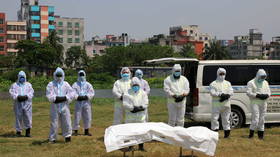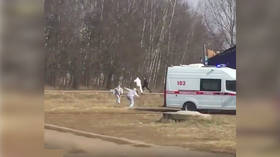The speed at which the British media became McCarthyite authoritarians has been almost as fast as the spread of Covid-19
While many pontificate about what Covid-19 might mean for the future – of work, travel etc – little attention has been paid to the future of British media, which has become the cheerleader and bullhorn of state authoritarianism.
Britain has long prided itself on being the bulwark of democracy, and at the core of this claim has been its free press. The right to speak truth to power, to challenge government and the establishment and hold them to account; the defence of democratic rights like free expression and speech, free association and assembly; these things have always been upheld as an example to the world to be cherished as indispensable to a free society and defended at all costs.
Also on rt.com Five questions UK media should have asked of its government during Covid-19 – but didn’tBut since the start of the coronavirus crisis, the British media has turned ‘Chinese’. This has nothing to do British journalists’ or editors’ fondness for Chinese cuisine. It is the remarkable speed at which they have embraced the authoritarian non-democratic practices they like to attribute to the Chinese Communist Party.
In an era when “unprecedented” has become the adjective of the year, this turnabout has been truly unprecedented.
A year ago, the Guardian and others condemned the Chinese government for introducing a social credit system that forbade 23 million citizens from buying travel tickets because the state decreed they were not behaving properly. The British media attacked this move as a fundamental attack on the autonomy of the individual and the freedom of movement in China.
However, one year later, as the Covid-19 crisis unfolded, this same media was at the forefront of the clamour for the government to start behaving like Beijing: the Sun newspaper reported uncritically how British Transport Police had been deployed to enforce a ban on “unnecessary travel.” The Guardian – the defender of the right to travel in China – dutifully announced and endorsed a government decree “advising” the UK public to avoid all non-essential travel. The BBC unquestioningly reported the London mayor proclaiming that key workers and “nobody else” should be using public transport.
Freedom of movement in Britain? Forget it. In a flash, the British government has restricted travel for almost 60 million citizens – the same number of people quarantined in China’s Hubei province – and hardly a voice is raised in protest in the media.
The lack of dissent in the media is not surprising, given that they had been in the vanguard of demanding a state clampdown. One of the most notable and disturbing developments of the government’s daily press briefing was how journalist after journalist spoke out calling for a lockdown to be put in place – or asked why one hadn’t been implemented earlier. This was unprecedented: representatives of the free press standing up and demanding that the government bring the police in to get tougher with transgressors of social distancing.
Initially, the lines of attack by the media followed the previously existing culture war. Remain-supporting papers could not resist politicising a medical crisis to plough their political predilections. Toby Helm of the Observer, for example, was quick to argue that "Brexit means the coronavirus vaccine will be slower to reach the UK." He claimed Covid-19 was payback for Brexit since, apparently, the vaccine (which does not yet exist) will “cost more here because of the UK pulling out of the European Medicines Agency on 30 December.”
Also on rt.com This Covid-19 sermon on the BBC was biased, patronising & insufferable virtue signalling – we shouldn’t be forced to pay for itWhile the culture war battle lines remain, the media’s politicisation of the medical crisis united them into an undifferentiated authoritarian mob – carrying pens and laptops rather than pitchforks – that demanded tough draconian action by the government, from introducing social distancing and restricting movement to shutting down the economy, which is truly unprecedented. And now that they’ve got it, they have become an indispensable part of the government’s propaganda bullhorn and surveillance.
The media’s role in politicising the Covid-19 crisis is an important development. Their abandonment of the critical role of speaking truth to power is irresponsible and a betrayal of the principles of a free press.
Demanding draconian steps, while not taking responsibility for outcomes or having to deal with the consequences, is morally bankrupt and unforgivable. The idea that they can now criticise the government for the devastating economic and social consequences of the lockdown – a policy they have championed and demanded from the outset – is just staggeringly arrogant and hypocritical.
But the worse thing by far – and this is what will truly determine the future of so much – is that their conversion to authoritarianism is being justified as an inevitable outcome of the pandemic. “It is the pandemic that forced us to demand a lockdown, my lord” is their defence. But pandemics don’t shut down economies, governments do. And they do so with greater ease when there are no critical voices demanding alternatives or caution.
The lockdown and its consequences belong to the government and the media. This was not an accidental outcome. It is an outcome the media ought to have questioned and debated openly and without political bias. The stakes are just too high.
What we should draw from this is that the freedoms that underpin the role of a free press – freedom of thought and speech – are not optional extras, peccadilloes we indulge in when times are good. They are foundational, especially in crises like Covid-19. They are indispensable tools we need to ensure we deal rationally and democratically with a health crisis. The virus, and especially man-made decisions taken over it, will impact all of us directly way beyond the immediate challenge of dealing with the threat of death.
Unfortunately, the British media’s critical faculties have gone into self-isolation. The banner of critical and open debate (with outspoken exceptions like the excellent mainstream iconoclast Peter Hitchens) has had to be carried by smaller media outlets like Spiked and the Spectator instead. Whether the mainstream media will return to play its historic role or remain furloughed is an open question. But whatever happens, they should be held to account just as we will do to our politicians and experts in the months ahead.
If you like this story, share it with a friend!
The statements, views and opinions expressed in this column are solely those of the author and do not necessarily represent those of RT.















